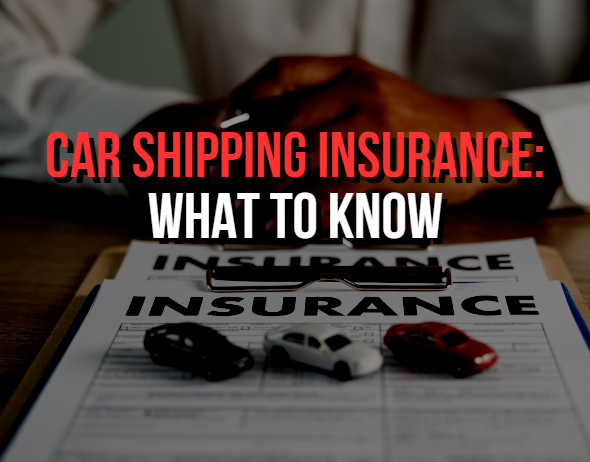What You Need to Know About Insurance Coverage in Auto Transport
Transporting your vehicle can be a stressful experience, especially when considering the potential risks involved. From road debris to weather conditions, several factors can affect your vehicle during transit. This is why understanding auto transport insurance is crucial when shipping your car. In this article, we will delve into everything you need to know about car shipping coverage and vehicle protection, ensuring you have peace of mind throughout the transport process.
Understanding Auto Transport Insurance
Auto transport insurance is a specialized form of coverage that protects your vehicle while it is being transported by a shipping company. This insurance is essential because, despite the best efforts of transport providers, accidents and damages can still occur during transit.
Types of Coverage
There are typically two main types of insurance coverage you should be aware of when shipping your vehicle:
-
Basic Coverage:
- Most auto transport companies provide basic insurance coverage that typically covers the vehicle’s market value during transport. This insurance often includes protection against damages incurred while the vehicle is in the carrier’s possession.
- However, it’s crucial to understand that basic coverage may not cover everything. It usually applies only to damages caused during transit, excluding factors like personal items inside the vehicle.
Additional Coverage:
- Many transport companies offer additional insurance options for an extra fee. This can include more extensive coverage that protects against a broader range of incidents, such as theft, vandalism, or damages incurred before or after the transport.
- Additionally, some companies allow you to purchase a separate policy from an insurance provider that specializes in auto transport.
Coverage Limits
Before you commit to an auto transport service, it’s essential to inquire about the coverage limits of the insurance they offer:
- Market Value: Basic coverage usually covers the vehicle’s market value, which might not account for customizations or special features that could increase its worth.
- Deductibles: Some insurance policies come with deductibles, which is the amount you’ll need to pay out of pocket before the insurance kicks in. Be sure to understand the deductible amounts associated with your chosen policy.
The Importance of Vehicle Protection
Having adequate insurance coverage during auto transport is vital for several reasons:
1. Peace of Mind
Knowing that your vehicle is protected during transit provides peace of mind. Whether you’re shipping a family car, a classic vehicle, or a luxury car, having insurance in place alleviates worries about potential damages or losses.
2. Financial Protection
Repairing or replacing a vehicle can be costly, and without proper insurance, you could face significant out-of-pocket expenses. Insurance coverage protects your financial investment and ensures you’re not left bearing the full brunt of unexpected costs.
3. Professional Standards
Reputable auto transport companies will prioritize customer satisfaction and safety, which includes offering comprehensive insurance options. Choosing a company that provides robust insurance coverage is an indicator of their professionalism and commitment to quality service.
What to Ask Your Transport Company
Before booking your auto transport service, here are some critical questions to ask regarding insurance coverage:
- What type of insurance coverage do you provide?
- Understand the specifics of both the basic and any additional coverage options available.
What are the coverage limits?
- Clarify the maximum coverage amount and whether it reflects the current market value of your vehicle.
Do you have a deductible?
- Ask about any deductibles associated with the insurance and how they affect potential claims.
Are there exclusions to the coverage?
- Inquire about what is not covered under the insurance policy. This can include personal items left in the vehicle, damages caused by natural disasters, or mechanical failures.
How do I file a claim if necessary?
- Understand the claims process, including the documentation required and the timeline for handling claims.
Preparing for Transport
In addition to securing insurance coverage, there are several steps you can take to further protect your vehicle during transport:
- Document Condition: Take detailed photos of your vehicle from multiple angles before handing it over to the transport company. This documentation can serve as evidence if any damages occur during transit.
- Remove Personal Items: Take out all personal belongings from your vehicle, as most transport companies do not allow items to be shipped inside the car. This minimizes the risk of loss or damage to personal items and ensures the driver can secure the vehicle properly.
- Communicate with the Transport Company: Discuss any special concerns you may have about your vehicle and ensure that the transport company is aware of any specific instructions regarding the handling of your car.
Understanding auto transport insurance is essential for protecting your vehicle during shipping. By knowing what types of coverage are available, asking the right questions, and taking steps to prepare your vehicle, you can ensure that your transport experience is as smooth and stress-free as possible. Whether you are moving to a new location or purchasing a vehicle from across the country, securing the right car shipping coverage will provide you with the confidence that your vehicle is protected throughout the transport process. Remember, when it comes to your vehicle, it’s always better to be safe than sorry! Search for insurance that is right for your needs. It is important if you rent a car.



